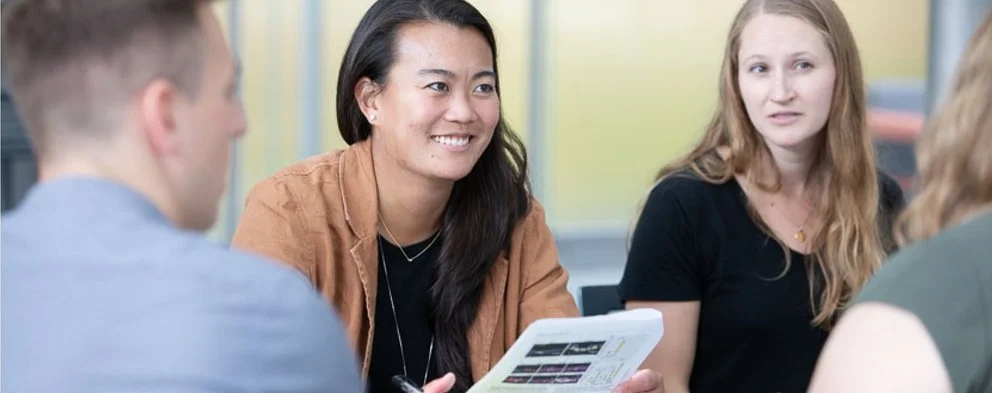Claudia Pienica, a consultant with experience working across the health care value chain in Israel and Western Europe, sought to improve her fluency in both business and science. Nora Rabah, an aspiring biotechnology executive whose family had struggled with the U.S. health care system as Syrian immigrants, was drawn to focus on expanding access to therapies. Andrew Foley, a consulting manager at a boutique life sciences strategy firm, hoped to apply learnings across the scientific and commercial domains to help launch new biopharma products.
Pienica, Rabah, Foley, and the other members of the inaugural cohort of Harvard’s MS/MBA Biotechnology: Life Sciences Program—a joint degree offered by Harvard Business School (HBS) with the Graduate School of Arts and Sciences and Harvard Medical School (HMS) through the Harvard Department of Stem Cell and Regenerative Biology (HSCRB)—represent a diverse array of backgrounds and interests, but they share a common goal: to become innovative leaders working at the nexus of business, science, and society.
Launched in 2020 and supported by a gift from the Chris and Carrie Shumway Foundation, the MS/MBA program is part of a broader effort backed by the Shumways to bridge the worlds of business and science by fostering an environment of collaboration and innovation across Harvard that will advance work on groundbreaking research and educate future leaders in the life sciences. The gift provides funding for programming, faculty research, student financial aid, and curriculum development—including the ethical implications of new therapeutics. It also bolsters HBS’s ability to partner with entrepreneurs and practitioners in the field to create new research and design executive education programs to serve their unique needs.

“Harvard has created an exceptional ecosystem that can develop and cultivate talented professionals across medicine, business, and life sciences who are best positioned to tackle global health challenges,” says Chris Shumway MBA ’93. “With Harvard geographically situated at the epicenter of Boston’s world-class life sciences community, with access to some of the leading hospitals, pharma, and biotechnology companies, we believe a tremendous opportunity exists to foster cross-pollination of ideas by marshaling the resources of Harvard and connecting with industry leaders to quickly understand and solve problems.”
Known as Shumway Fellows, the MS/MBA student cohort builds a tightly knit community drawing on each other’s diverse experiences. Fellows study general management at HBS and life sciences at HSCRB, a joint department of the Faculty of Arts and Sciences and HMS. Learning in this cross-School environment at the intersection of disciplines gives students the tools to approach problem-solving through a unique lens. It also fosters an entrepreneurial perspective, empowering them to launch, grow, and lead transformative organizations that will spur the ethical commercialization of new drug discoveries and therapeutics.
“Programs like this leverage the extraordinary resources of Harvard, including the expertise of the exceptional faculty co-chairs who helm the MS/MBA degree,” says Shumway. “Leaders born out of these programs will be equipped to drive organizations at the forefront of groundbreaking discoveries with the mindset needed to solve complex problems worldwide.”
Since beginning the two-year program, Pienica has had opportunities to coordinate a panel featuring senior leaders of the COVID-19 pandemic response from the U.K., Nigeria, and India; collaborate on a tech venture with a PhD candidate from MIT through a student-run incubator; and explore business development through an internship with a biotechnology company.
“On the MBA side, the case method has given me the opportunity to listen to the opinions of fellow students, who enable me to look at problems through a manifold of new perspectives,” says Pienica. “On the MS side, I get to tap into the scientific way of thinking again and learn how to enable disruptive scientific developments to achieve positive impact at a large scale. I’m thrilled to be part of this supportive and stimulating community.”

